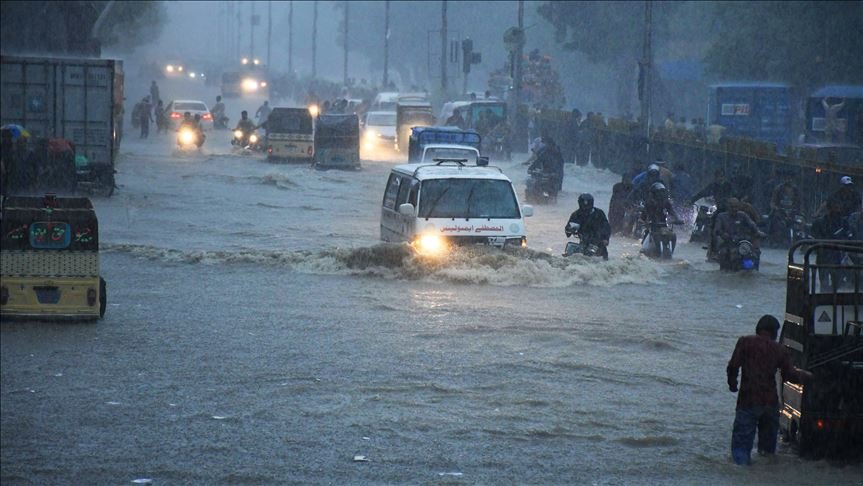The Pakistan Meteorological Department has warned Sindh of another monsoon spell this week from Thursday (July 14) till Monday (July 18). It is also said that sea conditions will also remain “rough to very rough” during this timeframe.
The Met department also said that torrential rains may generate urban flooding in Karachi, Hyderabad and other cities. It has also advised that travellers and tourists remain cautious during the forecast period.
Climate Change Minister Sherry Rehman shared a rain update on her Twitter, saying: “Sindh and Balochistan still under heavy monsoon pressure for the last 13 days. Sindh is 625 per cent above the 30-year average while Balochistan is 501.”
Sindh & Balochistan still under heavy monsoon pressure for the last 13 days. Sindh is 625 % above the 30 year average,Balochistan 501. @pmdgov reports a further rise in heavy rainfall starting tomorrow. Again the weather cycle will focus on Sindh,Balochistan for hi precipitation pic.twitter.com/LzXsSvhB6d
— SenatorSherryRehman (@sherryrehman) July 13, 2022
Action taken by the authorities:
Sindh Information Minister Sharjeel Inam Memon has claimed that rainwater from 90 per cent of the city has been drained out and roads have been cleared.
Meanwhile, K-Electric spokesperson Imran Rana tweeted, “Wherever possible power has been restored, however, few parts of DHA remain severely water logged like Bukhari Commercial seen below (as of 10:00 PM 12th July). Power in inundated areas expected to be restored once water recedes to safe operating levels.”
Wherever possible power has been restored however few parts of DHA remain severely water logged like Bukhari Commercial seen below (as of 10:00 PM 12th July). Power in inundated areas expected to be restored once water recedes to safe operating levels. pic.twitter.com/APgcRioam9
— Imran Rana, Spokesperson, K-Electric (@imranrana21) July 12, 2022
On Sunday, the Sindh government imposed a rain emergency in Karachi after severe rain. Chief of Army Staff (COAS) General Qamar Javed Bajwa took an aerial view of Karachi on Tuesday to oversee the catastrophic situation.
The Pakistan Navy is also taking part in the relief and rescue operations.
Destruction
According to the Provincial Disaster Management Authority (PDMA) and Sindh Police, 49 people have died in the province, 31 in Karachi alone, in the monsoon spell from July 4 to July 12.
This is about today's rain in Islamabad.i hope everyone's safe. It was raining cats and dogs! #KarachiRain #islamabadrain #KPKRains pic.twitter.com/mQWghp8C4P
— Mahaam (@Mayham_an) July 13, 2022
In Khyber Pakhtunkhwa (KP), at least six people were killed in Swabi, Mardan, South Waziristan and Bajaur districts. The rains also damaged the crops and infrastructure. Swabi, Dera Ismail Khan, Tank, Nowshera and Malakand were the worst affected.
Same situations in District Karak of KP. Rainwater seeped into homes, streets and shops as heavy monsoon rains wreaked havoc in several areas of Takht-e-Nasrati in Karak. People were forced to move out in the open due to water entering their houses and damaging everything inside. https://t.co/TPsflkefUD pic.twitter.com/P0vIiitYkC
— umar | عمر 🆇 (@iUmarKhattak) July 13, 2022
The entire village (Jhanda Gaown) was destroyed due to rains in Swabi. So far no relief has been provided by the KP government.#KPKRains pic.twitter.com/s2IcLsSflQ
— Ali Trimzi (@AlySyyed) July 10, 2022
Six people died and dozens of houses collapsed throughout over Eid across Balochistan. Many areas across Gilgit-Baltistan (GB) were cut off from each other after roads, bridges, electricity supply and properties were damaged due to the melting glaciers.
Relief, rehabilitation activities underway in rain- affected areas of #Balochistanhttps://t.co/8Yun2T4XPS pic.twitter.com/4SyUxHc5En
— Radio Pakistan (@RadioPakistan) July 13, 2022







